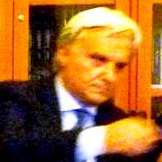Thank God, a staging where the director lets himself be seduced by the libretto (Arrigo Boito, under the pseudonym Tobia Gorrio) and does not try to bend the story to his mental whimsy! Amilcare Ponchielli's La Gioconda, presented by the Teatro di San Carlo, in a co-production with the Gran Teatre del Liceu of Barcelona, convinces, fully corresponding to the great expectations aroused by the announcement of a world class cast, and by the celebration of the 30th anniversary of star soprano Anna Netrebko's stage debut.
Romain Gilbert's direction gives a respectful interpretation of the plot in its historical context, also inserting some original ideas: the ghost of La Cieca who terrorises Barnaba in the finale; Alvise hiding Laura's presumed corpse under the floor. A classical setting (but not out of date) is put on intelligently by Gilbert with the support of Étienne Pluss' elegant sets, lavish costumes by Christian Lacroix and lighting by Valerio Tiberi. Not a picture-perfect Venice, though, but a grey and mysterious city lit by flames where tragedy hovers on every corner.
La Gioconda premiered in 1876, but it remains rarely produced, both for its genre (an Italian grand opèra, difficult to stage) and its intricate plot, not to mention the musical challenges facing the conductor. Here, Pinchas Steinberg chose to not drastically characterise his reading, but to be more condescending to the director's choices and the singers' needs. He was ably supported by a San Carlo Orchestra that reached one of its highest performing peaks in recent years, with an interpretation of great beauty, compactness and vitality.
The most acclaimed star of the evening was obviously Netrebko, for her charisma, the confidence with which she interpreted one of the most complex roles in the repertoire, her vocal ability (“Suicidio!” was particularly memorable) with an absolute mastery of her instrument. At the same artistic level was baritone Ludovic Tézier's Barnaba, making his character the evil prototype, the dark soul of many romantic melodramas. He exhibited brilliant ease in every nuance of tone, register and phrasing, starting from “O monumento” and up to the final duet in which he believes he has overcome Gioconda's resistance, but who instead kills herself.
Much less exciting was Jonas Kaufmann, who played Enzo. Of course, the tenor has great presence, technique and an unmistakable timbre. However, as even his most diehard fans must admit, his voice sounded very tired; his most anticipated aria “Cielo e mar!” demonstrated all his current limitations. In the role of Laura, Ève-Maud Hubeaux showed good vocal skills, although too timidly exhibited. Alexander Köpeczi's performance was also good as Alvise, showing off a darkly sonorous timbre. Kseniia Nikolaieva's Cieca was another nice surprise, vocally complete but also scenically effective, first as Gioconda's fragile mother, then as a sinister apparition.
The other supporting singers did also well, as did the excellent chorus directed by Fabrizio Cassi and the ballet choreographed by Vincent Chaillet. The children's choir directed by Stefania Rinaldi deserves a special mention.




